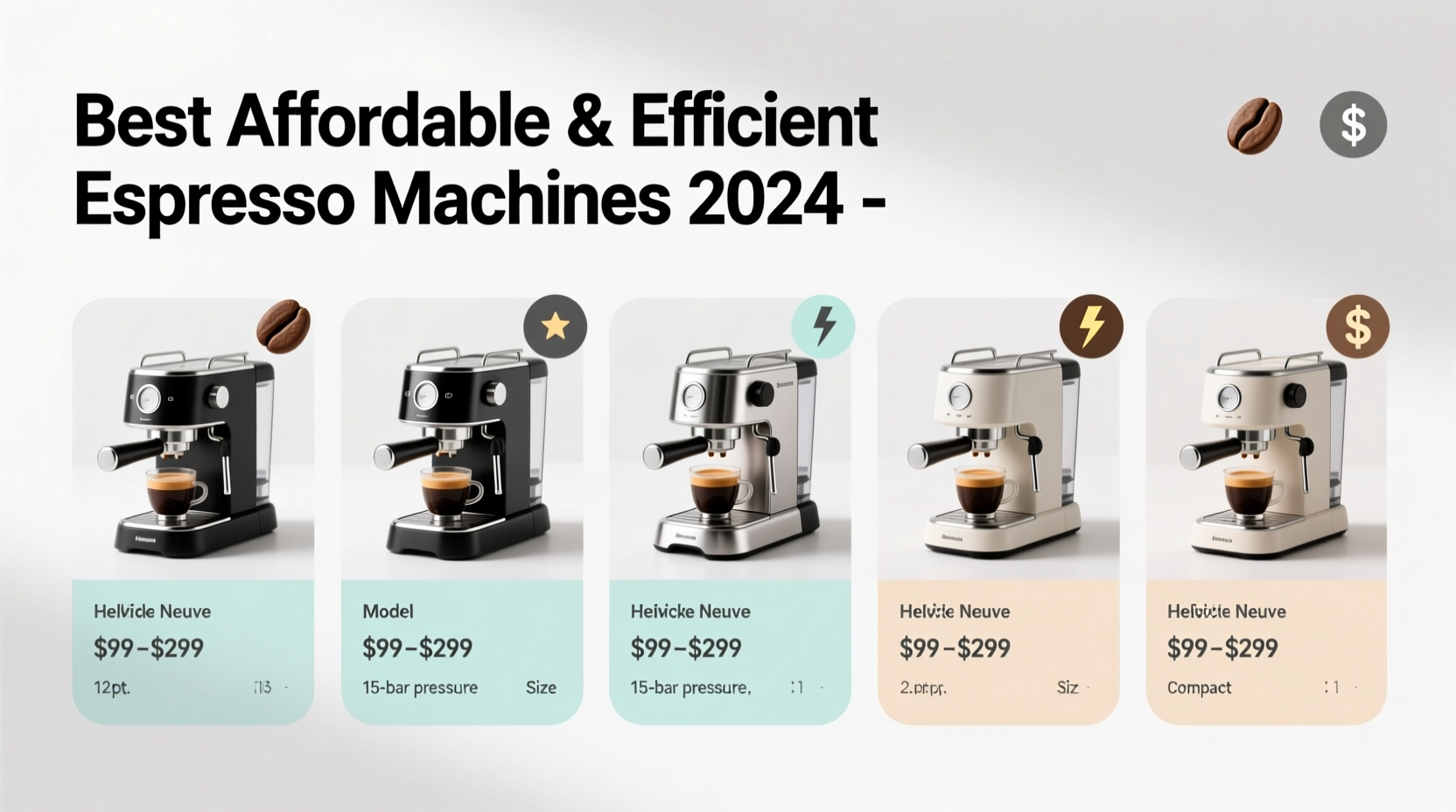For coffee lovers, there’s nothing quite like a rich, velvety shot of espresso pulled fresh each morning. While high-end machines can cost over $1,000, you don’t need to break the bank to enjoy barista-level quality. Today’s market offers several affordable and efficient espresso machines that deliver consistent results, compact design, and user-friendly operation. Whether you're a beginner or upgrading from a drip coffee maker, this guide highlights top-performing models under $300 that balance price, performance, and durability.
What Makes an Espresso Machine \"Affordable and Efficient\"?

Affordability in espresso machines typically means staying under $300 while still delivering solid extraction, reliable steam pressure, and durable construction. Efficiency refers not just to energy use but also to speed, ease of use, maintenance, and consistency in brewing. The best budget-friendly machines minimize wasted time and coffee while maximizing flavor and longevity.
Key factors to consider:
- Portability and size: Compact designs suit small kitchens or office spaces.
- Brew time: Machines that heat up quickly reduce morning wait times.
- Maintenance needs: Fewer parts and accessible cleaning routines improve long-term usability.
- Espresso quality: Look for consistent crema, balanced extraction, and temperature stability.
Top 5 Affordable and Efficient Espresso Machines
The following models are selected based on performance reviews, user feedback, and professional testing across multiple brewing conditions. Each delivers excellent value for under $300.
| Model | Price Range | Key Features | Best For |
|---|---|---|---|
| Bialetti Strega | $180–$220 | Lever-operated, aluminum body, manual control over pressure | Coffee enthusiasts who want hands-on brewing experience |
| Nespresso Essenza Mini | $170–$200 | Compact pod system, 25-second heat-up, low maintenance | Busy professionals seeking speed and convenience |
| De'Longhi EC155 | $100–$130 | Manual steam wand, 15-bar pump, compact footprint | Beginners learning milk steaming and tamping |
| Hamilton Beach 49986 | $60–$80 | Simple push-button design, built-in frother, easy cleanup | First-time buyers on a tight budget |
| Gaggia Classic Pro (Refurbished) | $280–$300 (refurb) | Semi-automatic, commercial-style portafilter, PID upgrade possible | Intermediate users wanting pro features at half cost |
“Even entry-level machines can produce exceptional espresso if used correctly. Technique matters more than price.” — Carlos Mendez, Home Barista Coach & Coffee Educator
How to Maximize Performance on a Budget
An affordable machine doesn’t mean compromising on taste. With the right practices, even a $100 model can rival higher-end units.
Use Fresh, Quality Beans
Start with freshly roasted, medium-dark beans ground specifically for espresso. Pre-ground coffee loses aroma quickly and often has inconsistent particle size, leading to poor extraction.
Dial In Your Dose and Tamp Evenly
For manual machines like the De’Longhi EC155, use 16–18 grams of coffee, distribute evenly, and tamp with firm, level pressure. This ensures uniform water flow through the puck.
Descale Regularly
Hard water builds up mineral deposits that clog pumps and reduce heating efficiency. Descale every 1–2 months using a citric acid solution or manufacturer-recommended cleaner.
Real-World Example: Morning Routine Upgrade
Sarah, a graphic designer working from home in Portland, used to drive to her local café daily for a double espresso. At $5 per visit, that added up to $1,300 annually. She invested $120 in a De’Longhi EC155 and a $70 burr grinder. After two weeks of practice, she was pulling balanced shots with creamy tan crema. Her total upfront cost: $190. Within three months, she’d saved enough to cover the entire setup—and now enjoys fresher, customizable coffee without leaving her kitchen.
Her routine takes less than 8 minutes: grind, tamp, brew, steam milk, clean portafilter. “It feels rewarding,” she says. “Plus, I can tweak the strength depending on how tired I am!”
Step-by-Step Guide: Brewing Great Espresso on a Budget Machine
- Preheat the machine for at least 25–30 seconds (longer for lever models).
- Grind 16–18g of fresh beans to a fine, table-salt consistency.
- Distribute grounds evenly in the portafilter using fingers or a tool.
- Tamp firmly and level with about 30 pounds of pressure.
- Lock in portafilter and start extraction immediately.
- Aim for 25–30 seconds for a 1-ounce shot with golden crema.
- Pull the shot when it starts to blond or drip too fast.
- Clean the basket right after to prevent residue buildup.
Checklist: Choosing Your Next Budget Espresso Machine
- ✅ Price under $300 (or refurbished under $350)
- ✅ Minimum 15-bar pump pressure
- ✅ Steam wand for milk-based drinks (if desired)
- ✅ Stainless steel or durable plastic housing
- ✅ Easy access to parts for cleaning
- ✅ Positive long-term reliability reviews
- ✅ Available replacement parts (seals, filters, baskets)
Frequently Asked Questions
Can I make real espresso with a cheap machine?
Yes—true espresso requires 9 bars of pressure and water heated to 195–205°F. Most semi-automatic and pod machines in this range meet those standards. However, consistency depends on user technique and bean freshness. Manual control gives better results over time.
Are pod machines like Nespresso considered \"real\" espresso?
Nespresso produces espresso-style shots using pressurized capsules. While not identical to traditional espresso due to lower water volume and proprietary blends, the output is strong, concentrated, and topped with crema. It's efficient and consistent, ideal for those prioritizing convenience.
How long do affordable espresso machines last?
With proper care, most budget machines last 3–7 years. Key factors include descaling frequency, water hardness, and usage patterns. Machines like the Gaggia Classic Pro (even refurbished) are known to exceed a decade with regular maintenance.
Final Thoughts: Smart Choices, Better Coffee
Great espresso doesn’t require a luxury appliance. By focusing on essential features—consistent pressure, reliable build, and user control—you can find a machine that fits both your kitchen and your budget. Models like the De’Longhi EC155 and Nespresso Essenza Mini prove that efficiency and affordability go hand in hand. For those willing to learn, even a $100 investment can transform your daily ritual into a moment of craftsmanship and pleasure.









 浙公网安备
33010002000092号
浙公网安备
33010002000092号 浙B2-20120091-4
浙B2-20120091-4
Comments
No comments yet. Why don't you start the discussion?